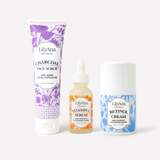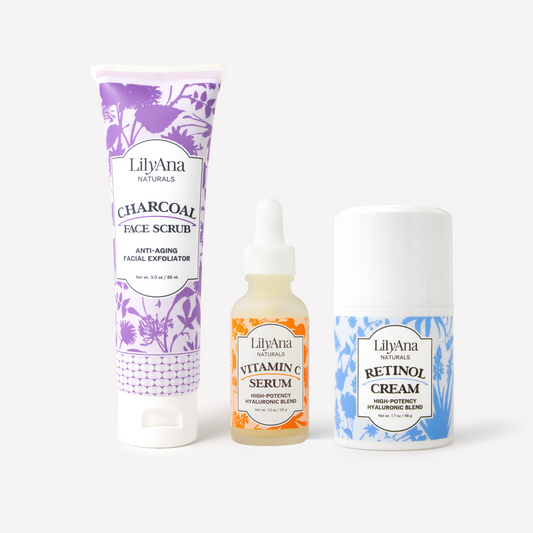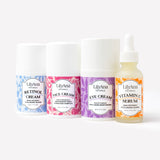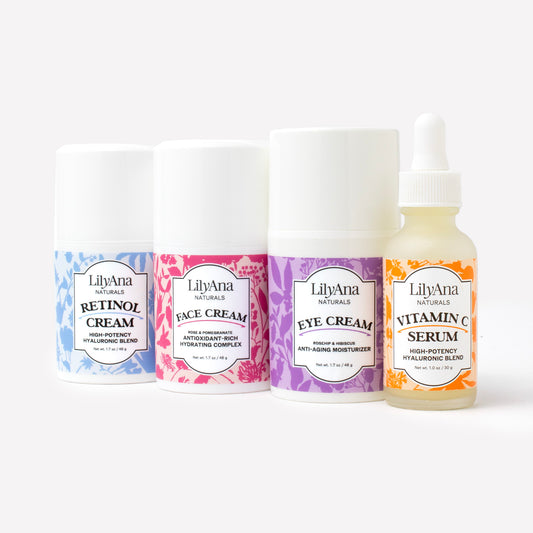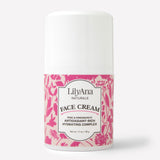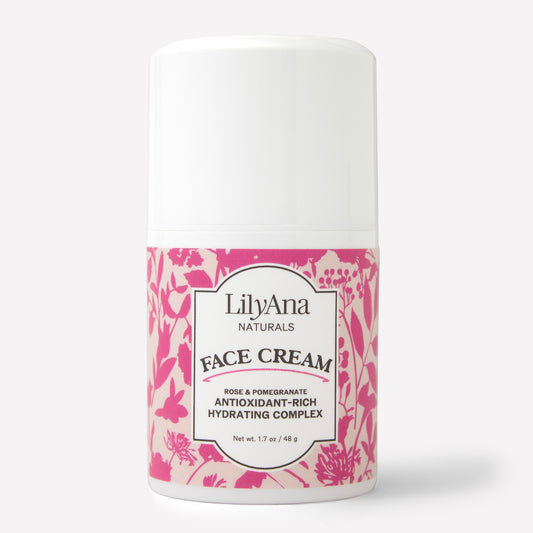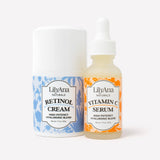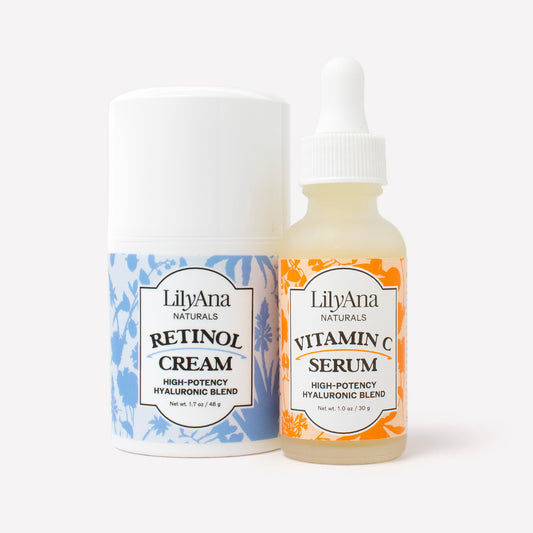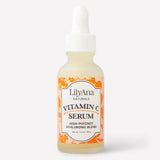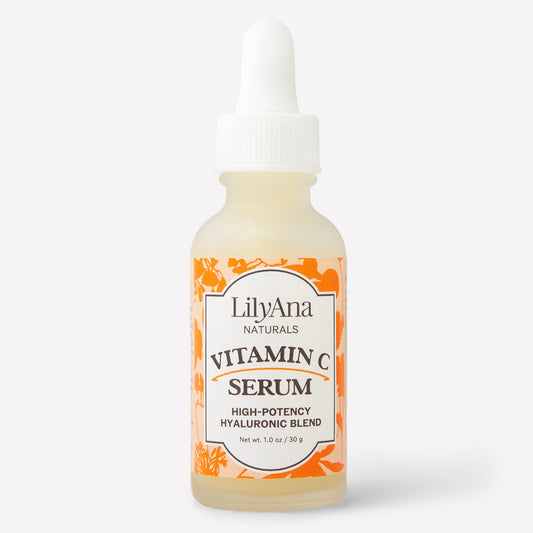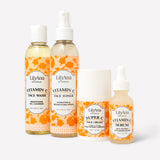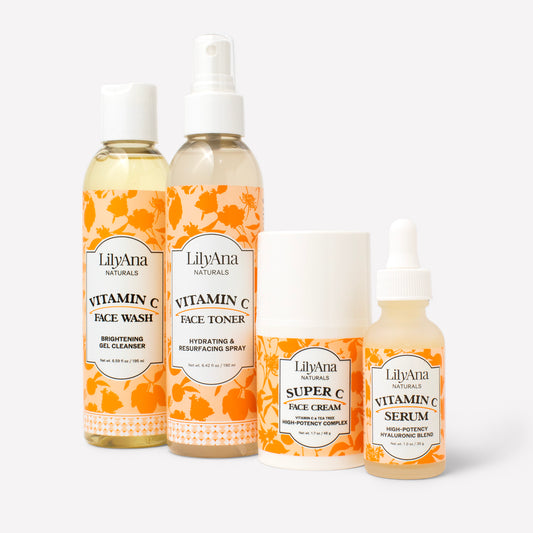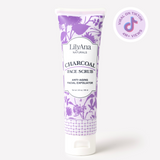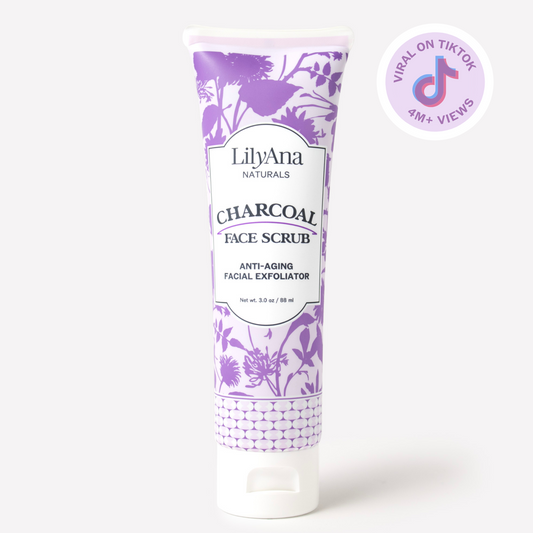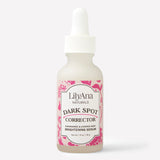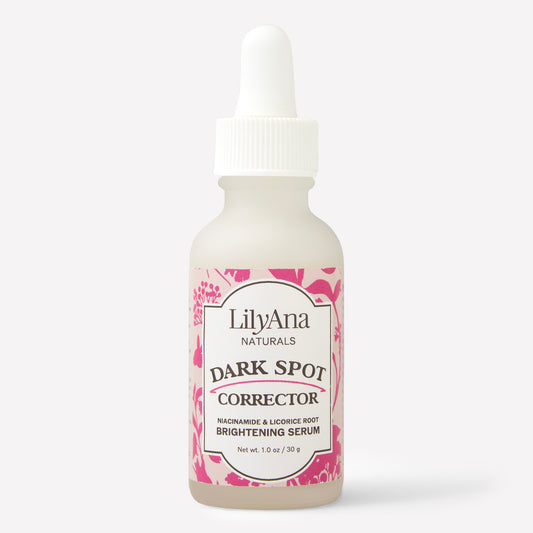If you are noticing new dark spots on your face, then you may be feeling slightly worried.
After all, we are often warned about the dangers of skin discoloration. But dark spots appearing on the face is a common condition, and can be caused by a number of different things.
In this article, we explore what causes dark spots, the proper skincare for getting rid of them, and tips for preventing them in the future.

What Are Dark Spots on the Face?
The official, medical name for dark spots on the face is hyperpigmentation. Your body naturally produces melanin -- that is, the pigment that lends color to your skin, eyes, and hair.
But when some areas of your skin produce more melanin than other areas, the result is hyperpigmentation. You may have also heard these dark spots called age spots, sunspots, or liver spots.
Dark spots on the face are nothing to worry about, nor do they require treatment for health reasons. However, some people prefer to use home remedies and dermatological treatments to remove them from their skin for cosmetic reasons.
What Causes Dark Spots on Your Face?
Dark spots appear on our faces for a number of reasons. Some of the most common reasons include:
Sun Damage
Sun exposure is the most common cause of dark spots on the face. We are constantly exposing our faces to the sun (or even tanning beds), so our faces are especially prone to sun damage and the dark spots known as solar lentigines, also called sunspots or liver spots.
Changes in Hormones
The American Academy of Dermatology has found that hormones can set off melasma, the skin condition that results in dark spots and other skin discoloration. Melasma is especially common in women, who experience hormone surges during pregnancy and their reproductive years.
Side Effects of Medication
Some medications include the frustrating side effect of leaving dark spots on your skin. Non-steroidal anti-inflammatory drugs (NSAIDs) are well-known for doing just this, as are psychotropic drugs and tetracyclines.
If you suspect that your medication is causing hyperpigmentation on your face, then have a conversation with your doctor before stopping the medicine. There could be an alternative medication that doesn’t have the same side effect.
Inflammation
Eczema, acne, and psoriasis are all conditions that inflame the skin, and can lead to dark spots on the face and elsewhere.
Recent Wounds
If you’ve recently been cut, burned, or bitten by an insect, then you may find that a dark spot remains as it heals. Fortunately, these types of dark spots usually fade over time.
Irritation
Dark spots on the face are very commonly caused by simple irritation. And believe it or not, cosmetic products are some of the worst culprits. This just underlines the need for safe and natural skin and hair products.
Diabetes
Dark spots caused by diabetes can appear anywhere on the body, including on the face. The condition of acanthosis nigricans causes darkened skin with a texture that feels like velvet, while diabetic dermopathy can be easily confused with age spots.
Will Dark Spots on the Face Disappear on Their Own?
If your dark spots have appeared as a result of something like acne or psoriasis, then stopping the breakouts will also stop the discoloration on your face. Similarly, if a skin care product is causing discoloration, then switching to a gentler product should end the problem.
Once the reason for the discoloration ceases, then most dark spots will begin to fade before they eventually disappear on their own. But fading does take time. If your dark spot is just a shade or two darker than your skin tone, then it may take 6-12 months to completely disappear.
If the discoloration is gray or slate blue, then it means the dark spot is deeper into your skin, and this type of spot could take much longer to disappear. Contrary to popular belief, skin type does not affect the natural healing process in any way.
You can speed up the fading and disappearing process by trying a home remedy or undergoing treatment.
How to Get Rid of Dark Spots on Your Face
Even though dark spots on your face do not require removal for health reasons, you may want to fix your skin for cosmetic reasons. If this is the case with you, then you have a lot of options.
To start, it’s helpful to speak with a dermatologist. These medical professionals can recommend specific creams or procedures based on your specific skin and case of hyperpigmentation.
Keep in mind that the most successful treatment will be determined by the cause and size of your dark spot.
Home Remedies
Over-the-Counter Lightening Creams
Over-the-counter skin lightening creams are a good place to start when the goal is brightening your skin and ridding it of dark spots. Lightening creams come at all price points, with a wide range of ingredients.
Many include alpha hydroxy acid or retinol, both of which promote the growth of new skin cells by exfoliating the skin. Search for a skin lightening cream that contains natural ingredients, and which has been recommended by a dermatologist.
When you are shopping for an over-the-counter skin lightening cream, look for one or all of the following ingredients. These ingredients are proven to lighten dark spots and slow down the production of melanin.
- Azelaic acid
- Kojic acid
- Vitamin C
- Glycolic acid
- Retinoid (retinol, adapalene gel, tazarotene, or tretinoin)
Natural Remedies
Not all natural remedies are created equal, but The Journal of Clinical and Aesthetic Dermatology published a study by which it was found that soy, mulberry, licorice extracts, and a vitamin B-3 form known as niacinamide are all successful in reducing the appearance of hyperpigmentation.
Make Up
Although cream-based concealers and other cosmetics won’t lighten your skin’s dark spots, they will cover them up.

Other Treatments
Hydroquinone
Hydroquinone has become a sort of buzz word of late. The ingredient is included in a number of skin lightening creams and serums. There is evidence that hydroquinone corrects skin discoloration, though the full scope of hydroquinone’s effectiveness isn’t yet known.
There are concerns that hydroquinone itself can cause cancer, though any research surrounding this is currently limited. The substance is considered “expected to be toxic or harmful” in Canada, and banned outright in South Africa.
The Food and Drug Administration (FDA) currently limits the concentration of hydroquinone to just 2% in over-the-counter products, and 12% in prescription products.
Laser Treatment
Laser treatment is a more aggressive option for getting rid of dark spots that your dermatologist may recommend. There are multiple laser treatments, but the most common is the intense pulse light laser, which specifically targets melanin and physically breaks up the darker skin spots.
In other words, the darker layers of your skin are burned off. Some of the risks of laser treatment on the face include scarring, redness, swelling, and changes in texture.
Cryotherapy
Cryotherapy is used to remove all sorts of undesirable skin blemishes, including hyperpigmentation. The procedure involves applying liquid nitrogen to each liver spot. The liquid nitrogen freezes the skin cells, which then heal lighter than before.
Chemical Peels and Exfoliators
Chemical peels and exfoliators are available in a range of strengths; some can be purchased over the counter, while others will need to be provided by a medical professional.
Regardless, all chemical exfoliators use different acids to break up dead skin cells on the outermost layer of skin. Once that top layer is removed, your skin should be healthier and more evenly toned.
Chemical exfoliators should be used infrequently, because it takes time for your skin to heal and rebuild. Using an exfoliator too often can lead to minor irritation or uncomfortable swelling. And as with any chemical product, discontinue immediately if you experience any side effects.
Microdermabrasion
Microdermabrasian is a procedure performed by a dermatologist. The doctor uses a device with an abrasive surface to essentially remove the entire first layer of your skin New collagen growth is encouraged, which typically reduces the severity of dark spots on the face.
How NOT To Remove Dark Spots on Your Face
Though lemon juice gets a lot of attention on social media, it isn’t quite the miracle some claim it to be. In fact, the American Society for Dermatologic Surgery states that lemon juice can actually worsen hyperpigmentation. The same can be said for apple cider vinegar, which can aggravate the skin and cause inflammation.
If you decide to try an over-the-counter skin brightener, then be sure to find one that does not contain mercury or steroids, as these can cause rashes or pimples, two potential causes for hyperpigmentation in the first place.
Finally, beware of injectable products that promise to lighten and brighten your skin. The FDA has declared injectable skin bleaching products to be both ineffective and unsafe. Some even include very harmful contaminants.
Should You Be Concerned About Dark Spots on Your Face?
The vast majority of dark spots on the face are harmless. However, if you notice a dark spot that seems different from the others, then it may be worth contacting your doctor or dermatologist.
For example, dark spots that are difficult to get rid of, or which:
- appear suddenly
- bleed
- change in color and/or size
- itches
- has a tingly feel
could be something more serious, like melanoma, a type of skin cancer.
How to Prevent Dark Spots on Your Face
Some simple preventative measures go a long way in avoiding hyperpigmentation. Because the sun is the biggest culprit when it comes to hyperpigmentation on the face, the best form of prevention is sun protection.
You should be wearing sunscreen in the sun, snow, rain, and fog, and whether you are outdoors or indoors. The most effective sunscreen will offer:
- SPF 30 or higher
- Broad-spectrum protection
- Titanium dioxide or zinc oxide
Other tips for decreasing your chances of acquiring new sunspots:
-
Wear a baseball cap or a wide-brimmed sun hat with sunglasses to keep the sun off of your face
-
Avoid the sun between the hours of 10 A.M. and 4 P.M., during which the sun is always at its brightest and most harmful
-
Promptly and gently treat acne and other skin conditions that could lead to inflammation
- If you are pregnant, applying an aloe vera gel to your skin could reduce pregnancy-related melasma (studies have shown this is effective after the fifth week of pregnancy, though you should always speak with your doctor first)
A Final Word
Dark spots on the face can be both annoying and alarming. Hyperpigmentation, as it’s medically known, occurs when areas of your skin produce more melanin than other areas. This can occur after an injury to the skin, excessive sun exposure, a hormonal change such as pregnancy, an acne breakout, or upon taking certain medications.
Fortunately, most dark spots fade on their own, though this can take time. In the meantime, you can try home remedies like over-the-counter skin lighteners and cosmetics, or more aggressive treatments such as laser treatments, microdermabrasion, and cryotherapy.
The best protection against dark spots in the future is sunscreen. Sunscreen with an SFP of 30 or higher should be worn every day, rain or shine. About 65% of people experience hyperpigmentation at some point in their life, with most occurrences happening later in life.
Though completely natural and nothing to be alarmed about, dark spots can be a frustrating roadblock when it comes to the health standards we set for ourselves.
